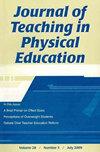Cross-Cultural Adaptation and Psychometric Properties of the Persian Version of the Life Skills Scale for Physical Education
IF 1.8
2区 教育学
Q2 EDUCATION & EDUCATIONAL RESEARCH
引用次数: 0
Abstract
Purpose : The purpose of this research was to develop and assess the psychometric properties of the Persian version of the Life Skills Scale for Physical Education (P-LSSPE). Method : During Study 1, which included four translators, eight physical education experts, and 45 physical education students, the LSSPE was translated and adapted into Persian, and its content validity was assessed. Study 2 assessed evidence for the factorial validity and reliability of the scale with a sample of 1,004 students. Study 3, which included 462 students, assessed nomological validity evidence. Results : In Study 1, the content validity analyses indicated that the P-LSSPE items and their dimensions were clear in language, practical in application, and represented the life skills in question. In Study 2, a bifactor confirmatory factor analysis model was the best representation of the data and provided evidence for the construct validity of the scale. In Study 3, evidence for the nomological validity of the P-LSSPE was provided, with the correlation coefficients indicating that teacher autonomy support was associated with students’ development of all eight life skills and total life skills. Discussion/Conclusion : Overall, the findings of this research suggest that the P-LSSPE can be used to accurately measure the life skills development of Iranian physical education students.波斯版体育生活技能量表的跨文化适应与心理测量特征
目的:本研究的目的是开发和评估波斯语版体育生活技能量表(P-LSSPE)的心理测量特性。方法:在研究1中,包括4名翻译人员、8名体育专家和45名体育学生,将LSSPE翻译成波斯语,并对其内容效度进行评估。研究2评估了量表的析因效度和信度的证据,样本为1004名学生。研究3包括462名学生,评估了法效度证据。结果:研究1的内容效度分析表明,P-LSSPE的条目及其维度在语言上清晰,应用上实用,并代表了所讨论的生活技能。在研究2中,双因子验证性因子分析模型是数据的最佳代表,为量表的结构效度提供了证据。在研究3中,为P-LSSPE的逻辑效度提供了证据,相关系数表明教师自主支持与学生所有八项生活技能和总生活技能的发展相关。讨论/结论:总体而言,本研究结果表明,P-LSSPE可以准确地衡量伊朗体育学生的生活技能发展。
本文章由计算机程序翻译,如有差异,请以英文原文为准。
求助全文
约1分钟内获得全文
求助全文
来源期刊
CiteScore
4.20
自引率
21.40%
发文量
69
审稿时长
>12 weeks
期刊介绍:
The Journal of Teaching in Physical Education (JTPE) features peer-reviewed research articles based on classroom and laboratory studies, descriptive and survey studies, summary and review articles, and discussion of current topics of interest to physical educators at every level. JTPE is endorsed by the Curriculum and Instruction Academy of the National Association for Sport and Physical Education and the International Association for Physical Education in Higher Education.

 求助内容:
求助内容: 应助结果提醒方式:
应助结果提醒方式:


